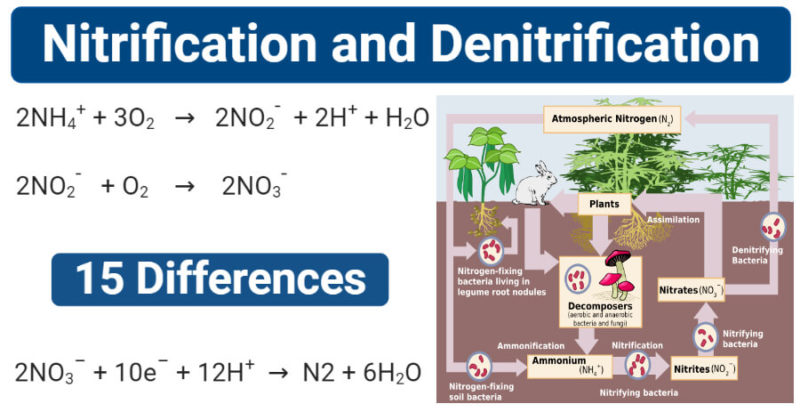What is the difference between nitrification and denitrification?
Nitrogen is a crucial element of life on earth. It is a component found in proteins and nucleic acid. The nitrogen cycle is the process through which nitrogen circulates in the environment.
The nitrogen cycle occurs in different stages such as nitrogen fixation, nitrification, nitrogen assimilation, nitrogen ammonification, and denitrification.
The main difference between nitrification and denitrification is that the former is a biological process of converting ammonia into nitrates while the latter is a process of converting nitrates into nitrogen gas.
Read More: Difference between Protein and Enzyme

Comparison Table (Nitrification vs Denitrification)
| Basic Terms | Nitrification | Denitrification |
| Meaning | It is a stage of the nitrogen cycle where ammonia is converted into nitrates | It is a biological process of converting nitrates into nitrogen gas |
| Process | Involves conversion of reducing nitrogen species into oxidize nitrogen species | Involves conversion of oxidizing nitrogen species into reducing nitrogen species |
| End Products | Nitrates | Nitrogen gas |
| Substrate | Ammonia or Ammonium ion | Nitrates |
| Microorganisms | Nitrosomonas and Nitrobacter | Thiobacillus and Pseudomonas |
| Inhibitors | Sulfur-containing compounds and N-heterocyclic compounds. | Vapam, acetylene, and cyanide |
| Temperature | Range from 20-30°C | Ranges from 26°C to 38°C |
| pH | Flourishes between 6.5 and 8.0 | Flourishes between 7.0 to 9.0 |
| Nutrition | Chemoautotrophic | Heterotrophic |
| Oxygen Concentration | High | Low |
| Nitrogen Cycle | Second stage | Last stage |
| Steps | Consists of two reaction steps | Occur through a series of the half-reaction |
| Importance | Provide nitrates to the plant | Wastewater treatment and ideal for aquatic habitat |
What Is Nitrification?
Nitrification is the second stage of the nitrogen cycle where ammonia is converted into nitrates. The conversion process can either be chemical or biological.
Ammonia is a reduced form of organic and inorganic nitrogen while nitrates are an oxidized forms of nitrogen. Therefore, nitrification is an oxidation process.
Nitrification is mediated by microorganisms and it is quite beneficial to these microbes since they obtain energy to facilitate their growth.
The bacteria responsible for nitrification are autotrophic and the process occurs under aerobic conditions. Keep in mind that too many nitrates are toxic to plants.
Read More: Difference between Purines and Pyrimidines
What Is Denitrification?
Denitrification is the process of converting nitrates into nitrogen gas. Therefore, denitrification is a reduction process. The action is performed by Lactobacillus, Spirillum, and Pseudomonas bacteria.
Most of these microorganisms are heterotrophs and the reaction occur under anaerobic condition. The process is beneficial for aquatic habitat and also wastewater treatment.
Main Difference between Nitrification and Denitrification
- Nitrification occurs under aerobic conditions whereas denitrification occurs under anaerobic conditions.
- Nitrification is the conversion of ammonia into nitrates while denitrification is the conversion of nitrates into nitrogen gas
- Nitrification is an oxidation process while denitrification is a reduction process
- The substrate of nitrification is ammonia while that of denitrification is nitrates
- The end product of nitrification is nitrates whereas that of denitrification is nitrogen gas
- Nitrification provide nitrates to plants while denitrification is ideal for wastewater treatment
- Nitrification consist of two reaction steps whereas denitrification consists of half series of reaction
- Microorganisms involved in nitrification are Nitrosomonas and Nitrobacter while those of denitrification are Thiobacillus and Pseudomonas
- Nitrification grows slowly while denitrification grows rapidly
- Nitrifiers are more sensitive to environmental stresses while denitrifier are less sensitive to environmental stresses
Read More: Difference between Macronutrients and Micronutrients
Comparison Video
Summary
Nitrification and denitrification are the main stages of the nitrogen cycle. Nitrogen is an essential element of life on earth. Nitrification has a high oxygen concentration and denitrification has a low oxygen concentration.
The core difference between nitrification and denitrification brainly is that nitrification is the process of converting ammonia to nitrates while denitrification is the process of converting nitrates into nitrogen gas.
More Sources and References
- Studies in Environmental Science. Science Direct
- Applied and Environmental Microbiology. National Institute of Health
- Nitrogen Cycle. Khan Academy